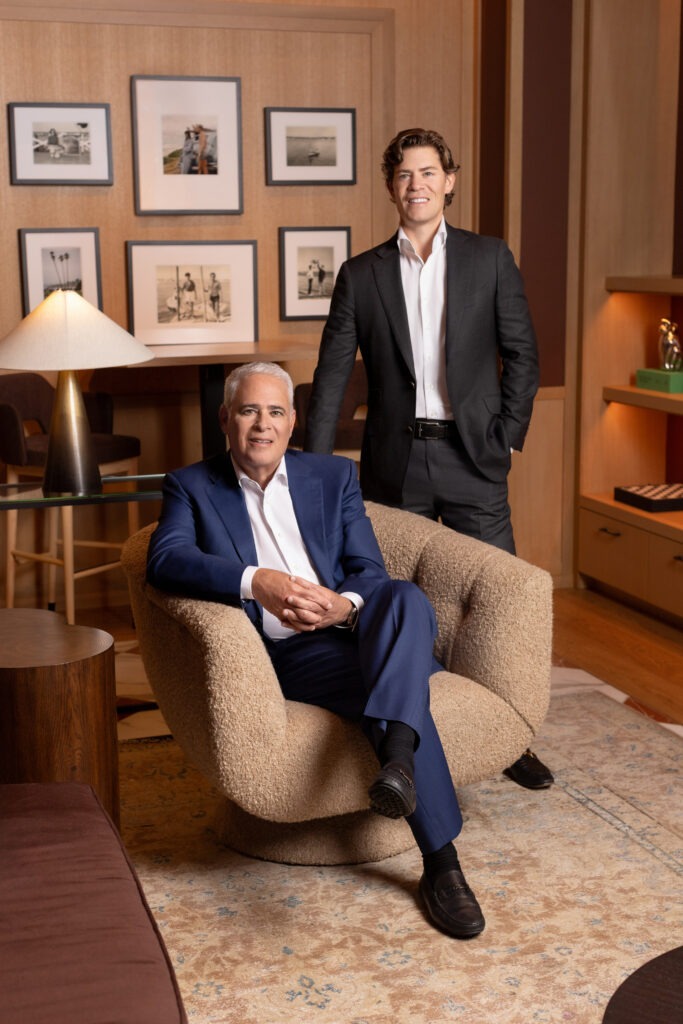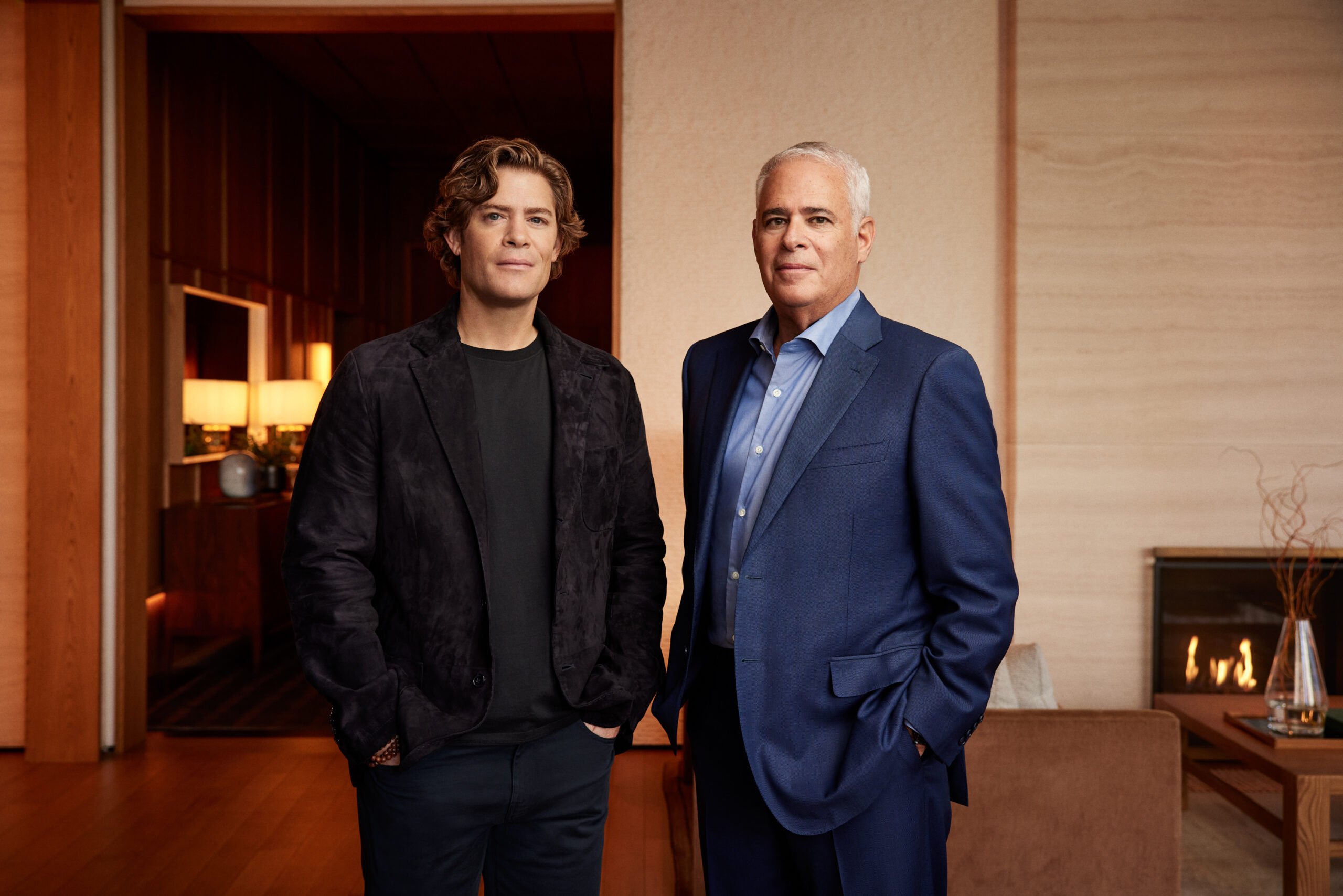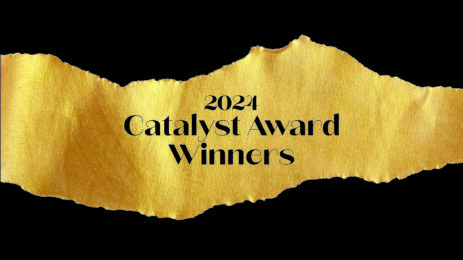Alan and Michael Fuerstman are Ahead of the Modern Luxury Curve
If you were setting out to redefine luxury for a new generation, what would you do? That is a question Alan Fuerstman asked himself when he opened Montage Laguna Beach in 2003 and continues to ask more than 20 years and 16 properties later. The founder, chairman and CEO is the visionary for an ultra-luxury, but “humble” brand that ranges from Montage Kapalua Bay in West Maui, Hawaii, to Los Cabos, Mexico and Big Sky Montana. Two more are in the works—Montage Cay on a private island in the Bahamas and Montage La Quinta in California.
The boutique brand operates under the tagline of “impeccable hospitality” and the definition of piecing together a meaningful whole as seen in movie transitions could apply to the focus on blending exceptional culinary programs, wellness experiences, dramatic art and local touches that make up the welcoming whole at any of the properties.
The same is true for the company’s Pendry sister properties, which Fuerstman launched in 2017 with his son, Michael, in San Diego’s Gaslamp Quarter with a commitment to polished comfort with a modern edge and a little lower nightly price tag. That younger brand has already grown to 13 properties, including West Hollywood and the newest labor of love—Natirar, a 500-acre stately estate in New Jersey’s Somerset County.
I sat down with the winners of the 2024 Catalyst Fusion Award to ask what informs their unique choices, how they help meeting professionals deliver elevated experiences and what is next.
Unscripted Elegance
 The first thing to know about Alan (we will use first names to distinguish the two Fuerstmans and because they make everyone feel like an old friend when you talk to them) is that he is straightforward about what he feels. Exhibit A: “When I started Montage, my biggest criticism of Old World, traditional luxury was it was too stuffy, too pretentious, too scripted,” said the man who lives at Montage Laguna Beach with his wife and started his hospitality career as a part-time doorman at a Marriott hotel in high school. After working his way up through housekeeping and food and beverage to ultimately managing the legendary Phoenician resort in Scottsdale, Arizona, he came to believe that the next generation of luxury consumers would be looking for a more gracious and humble approach to luxury.
The first thing to know about Alan (we will use first names to distinguish the two Fuerstmans and because they make everyone feel like an old friend when you talk to them) is that he is straightforward about what he feels. Exhibit A: “When I started Montage, my biggest criticism of Old World, traditional luxury was it was too stuffy, too pretentious, too scripted,” said the man who lives at Montage Laguna Beach with his wife and started his hospitality career as a part-time doorman at a Marriott hotel in high school. After working his way up through housekeeping and food and beverage to ultimately managing the legendary Phoenician resort in Scottsdale, Arizona, he came to believe that the next generation of luxury consumers would be looking for a more gracious and humble approach to luxury.
When he had a chance to open a new-build property on a bluff overlooking the Pacific Ocean, he focused on a more comfortable style of service and product that incorporated quality craftsmanship in architecture and interior design, but with the warmth of the local culture and gracious, approachable attentiveness. “A luxury hotel resort has to have a sense of place. Our guests are looking for the joy of discovery and local culture,” he said.
Michael is laser-focused on meeting the needs of a next generation of luxury guests, even if they don’t know they need it yet. “Good hospitality is a well-rounded, grown-up version of substance with a different flavor that reflects the specific neighborhood, whether that is Baltimore or New York. They get a sense of what’s culturally happening in that city at that time.”
Modern guests are also looking for brands that respect their commitment to wellness, which means designing fitness facilities that aren’t tucked away in a basement, having healthy menu choices and sumptuous spas with the latest features such as cold therapy. “We have to make them feel like they’ve been their best, fullest, most healthy versions of themselves,” Michael said.
Both entrepreneurs agreed that over the last 20 years, the industry has shifted to trying to deliver local experiences in buildings that don’t look like they were delivered off an assembly line. They just got out in front of the shift, and they plan to stay there.
The Best Version of Home
When asked how they want guests to feel when they leave any of the properties, Alan didn’t even pause. “I want them to feel inspired. I want them to feel like they stayed in something that was the best version of what their home would feel like.”
During the design process, he deconstructs the guest experience to think through the different beats of a hotel stay, and then determines the highest and best use of the space, including the best mix of restaurants, bars and entertainment venues. “You want that person to feel like this was made just for them,” he said. “We want our guests to leave with a connection with our staff, that they recognized them and had a connection beyond just the transactional parts of staying in a hotel.”
Michael agreed with his father. “That’s the Holy Grail,” he said. “If a guest thinks, “I trusted them and they felt like family, like I’m coming back,’ that helps us build a deep connection, repeat business, love for our brands and allows us to grow and create opportunity for our colleagues.”
Team Work Makes the Dream…
Alan’s journey from his New Jersey roots taught him that the magic comes from the back of the house. “There are no more important or less important roles in a hotel. They all work together to create the guest experience. A deep fondness for our staff that provides the service and delivers the day-to-day experiences is built into the culture of our company. Hopefully, that becomes an expression of how we take care of our guests,” he said.
Michael confirmed that his father ingrained in him the hotel etiquette of being the last one off the elevator and stooping to pick up any piece of paper seen on the floor when walking around. He started as a pool attendant, handing out towels at Bellagio Hotel & Casino. “I loved growing up in and around the industry. I always liked the action and the energy and being around people,” he recalled of his motivation to go into the family business.
After the fun of the pool deck at Bellagio, he went to work at The Charles Hotel, Cambridge while attending Tufts University. “I got a taste of the nuts and bolts of how a hotel operates, how people communicate, what it’s like to be part of a team, solving problems and taking care of guests every single day.”
He further reflected. “Hotel work is hard; it’s a physically demanding business. The hours are long, but for those of us who get to work in this business, we do it because we love it. We like taking care of people and there’s an energy that comes with that.”
He compares the operation of a hotel to the hardware and software. The building design, architecture and location have to be right and you have one shot to do that right. But then it’s powered by the people consistently making modifications and improvements and doing everything to execute flawlessly.
Highest and Best Meeting Spaces
That commitment to creating interesting places extends to the ballroom and pre-function spaces. From indoor-outdoor options and opportunities for natural light to unique treatments and decor, meetings are designed to include local flare.
“Hotel work is hard; it’s a physically demanding business. The hours are long, but for those of us who get to work in this business, we do it because we love it. We like taking care of people and there’s an energy that comes with that.”
–Michael Fuerstman
Alan likes to anticipate how meeting planners will use the spaces in a given hotel, including the restaurants, which often are contracted for buyouts. “We design them as flexible spaces so if a buffet has to be popped in, it won’t look like an afterthought,” he said.
Alan is most excited about focusing beyond what’s happening at the hotel. Properties offer bookings for unique experiences such as a helicopter trip to Catalina for a picnic at Laguna Beach, kayaking with dolphins or venturing into a rainforest. Penry Park City offers dark sky stargazing and the storytelling that goes along with it. “Unique opportunities help meet our guests’ sense of curiosity and it’s our responsibility again to help curate those things,” he said.
Michael, reflecting his father’s no-nonsense approach, explained that taking care of conference guests is all about paying attention. “None of this is rocket science. It’s just really good execution of really good themes that should have probably been applied to the meeting planner and group community even earlier, but we understood that first.”
Not Compromising on Growth
After a strategic investment earlier this year from Goldman Sachs Asset Management and BlackRock through Luxor Capital Group, the company is poised to open properties in the United States and beyond. “Growth is about quality rather than quantity,” said Alan. “There’s no magic number to how large we want to be on either brand. What’s most important to us is that as we add Montage and Penry hotels, that each new property lives up and is consistent with the quality and offering of our existing portfolio that we are not compromising.”
Michael called into the conversation from the Natirar property, which was receiving final touches on the 500-acre property less than an hour outside of New York in Somerset County that was previously owned by the King of Morocco before it was completely redesigned. The 66-key resort includes a ballroom with a living green wall, a 10-acre farm, a cooking school and a social pavilion.
“We love what we get to do,” he said, looking around the rolling green landscape the pair have been working to turn into its current iteration for eight years. “There are very few places like this,” he said, and his father nodded his agreement.


